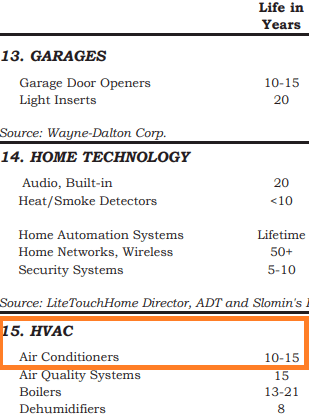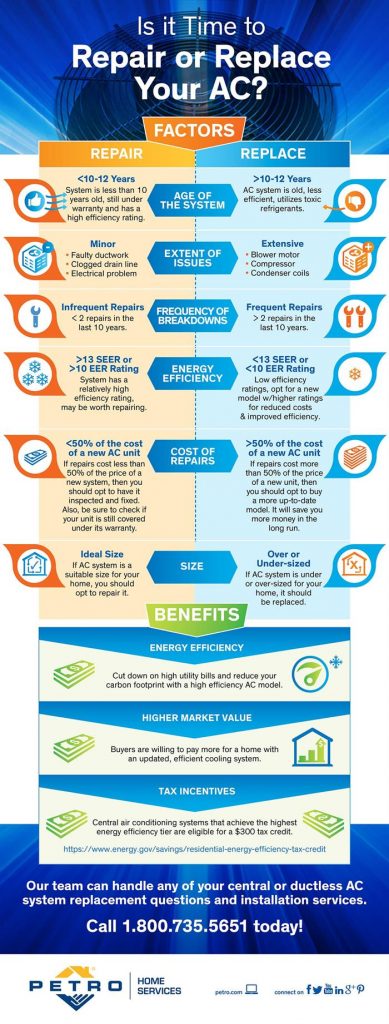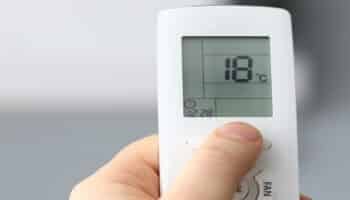We've independently reviewed this article to make sure it's as accurate as we can make it.
To find out more about our article creation and review process, check out our editorial guidelines.
Air conditioner not performing as you need it to? Well – here’s a bit of good news.
Almost any air conditioner issue can be repaired. But an old AC can get expensive. So the question is, should you repair or replace your air conditioner?
If your air conditioner is over 10 years old and uses the old R-22 refrigerant, you should consider replacing it. Otherwise, try multiplying your repair quote by the age of your air conditioner. If it’s less than $5,000, consider repairing. But there’s more to it than that – read on for more details.
Note that this 10 year rule is mostly influenced by the manufacturers warranty (typically 10 years long).
Some manufacturers had exclusions like it had to be registered at time of install or the warranty was only good for ten years to the original homeowner. Some manufacturers allowed a warranty transfer to the new homeowner for a nominal fee. Generally, if the unit is still under a part warranty with the manufacturer, then it is usually smart to repair. If your part warranty is expired and you have a large component like a compressor fail, it is then a lot harder call.
Factors to Consider
There’s a few factors you should consider to help you make the repair or replace decision for your air conditioner.
Let’s walk through them step by step. Here comes the details!
Age
Air conditioners max out at around 10-15 years old. They’re more robust than most large appliances, but above a decade and you’re just asking for trouble.

Don’t believe me? Take it from this study by the National Association of Home Builders
No matter the quality of an appliance, things start to wear down eventually. If it’s more than 15 years old, the cost to just keep it alive (let alone running efficiency) might end up as more than just getting a new, better system.
However if it’s less than 10 years old, it’s rare that a repair isn’t worth it. It’d have to practically be blowing up or with a non-existent warranty. So be aware if a contractor is trying to push your into replacing an air conditioner under a decade old.
It’s always worth checking to make sure you don’t have a part warranty with the manufacturers. Don’t always believe the information the contractors tell you – it’s easy to double check just to make sure. Just get your model and serial on the outside AC, and then google “warranty search” for that manufacturer of your AC.
Repair Cost
The actual cost of your repair can be the deciding factor between chucking or it committing to sticking. There’s a simple but genius formula suggested by ASMAIR. They multiply the repair cost by the age of the air conditioner, compared to the cost of a new system.
Work out:
Repair Cost x Age (Years)
For example:
$300 x 12 Years Old = $3600
By accounting for age, we can get an idea of how expensive maintaining an old AC with damaged parts can be.
While new systems may vary, some contractors like Brad Wentz – owner of Buckeye Heating & Cooling – suggest a ballpark figure of $5,000. If repair x age is above that, think about a replacement. http://www.angieslist.com/companylist/us/oh/worthington/buckeye-heating-and-cooling-reviews-68418.htm
A quick repair on a new model will cost less and last longer than a repair on an older model.
Comparing Repair Cost to a New System
Now compare the cost we worked out above to the cost of a new system.
New Air Conditioners, with installation, can cost anywhere from $3-7,000. That doesn’t include any ductwork upgrades which you may need if your system is outdated.
In the US and most other countries, there are a lot of rebates and tax credits available for new, more efficient AC units.
If your repair x age is well beyond the cost of a new system, upgrading may be better in the long run. In our example case, it’s on the lower end of the new AC cost. So I’d be likely to stick with just a repair for now.
Do You Just Need Some Extra Power?
A great alternative to expensive maintenance or upgrades is through a one-room air conditioner. By using a portable or window air conditioner in your main space, you can reduce the demand on your central system. It’s a great way to solve the problem within a day at a cheap cost, without contractors turning up at your door.
If you’re considering it, check out our amazing guides to portable air conditioners, and quiet window air conditioners.
How Are Your Bills Looking?
One sure sign of a dating air conditioner is a drop in efficiency.
You’ll see this most in your energy bills. If it’s costing you $50 extra a month for cooling this year against last year, that may be from an aging air conditioner. (Provided it’s not just super hot this year!).
There’s actually a quick way to check if you’re using too much. Energy Star have a tool that shows how much energy you’re using compared to similar sized homes: but you’ll need your latest 12 month utility bill summary to put into the calculator.
Let’s Talk Energy Efficiency
Heating and cooling costs account for over 40% of the average energy bill. So we want to make sure we’re getting the most bang for our buck with air conditioners.
Unfortunately, efficiency is the first thing to go when an air conditioner starts to wear down. Outside for a lifechanging repair job, the only way to get full efficiency back is with a new system. One which should be way more efficient since it’s newer.
SEER is how energy efficiency is rated (Seasonal Energy Efficiency Ratio).
Until 2006, SEER only need to have a rating of 10. Nowadays? It has to be 13 minimum. That’s roughly 30% cheaper on your energy bill.
If you really want to supercharge it, SEER 16 will just about double those savings – but for a much higher upfront cost.
Rising energy bills is one of the surest signs your air conditioner or ductwork need a helping hand.
What Refrigerant Are You Using?
Air conditioner refrigerants can sound like a confusing topic, but it’s relatively simple.
Older models use a refrigerant called R-22. This is bad – it’s harmful to the environment due to a lot of chlorine. Newer models (post 2010) use R-410A. This is much better for the environment (AND more efficient for your air conditioner).
While there’s no urgency to get an AC with the new refrigerant, just be aware that air conditioners with the old refrigerant will get costlier to repair as they get rarer and rarer.
R22 stopped getting produced at the end of 2019. It’s going to be harder to find (and more expensive) repairs for older air conditioners.
Want to know more? Check out our full guide to air conditioner refrigerants and what they mean.
How’s Your AC Performing?
Even if you’re AC is in need of repair now, how was it performing before it did? If it’s simply not got enough power (or lost too much of it), it may not be worth repairing at all.
Summers are only getting hotter, and air conditioners are getting older. Chances are that – barring amazing repair results – your AC’s performance will only go down over time (naturally).
If your system’s been struggling to keep up with your cooling demands, consider a new one for this alone. Struggling may just mean always on full power just to maintain a temperature, rather than oscillating on and off.
Any Ductwork Issues? You Can Tell If It’s…
Noisy! Running on maximum power won’t just cause wear and tear on your ac, it also makes for plenty of noise too. Even if your central system’s based outside you’ll be hearing the whirlwind through the ducts.
Dusty! As many know it’s not just the air conditioner that needs maintained – it’s ductwork, too. Plenty of dust accumulating means there’s likely leaks in your ductwork. These can massively drop the air conditioners efficiency.. since it’s working hard to cool air from extra spaces.
Has Your Home Size Changed?
Air conditioners need to be installed according to the size of a home. However, many of us will enjoy the (quite stressful) adventure of adding a home extension in our lifetimes.
If that’s the case, the demand on your air conditioner will have increased. Which may be putting your AC under too much stress.
If your AC is struggling after your home size has increased, consider an upgrade, rather than a replacement!
Have You Considered A Bit Of DIY?
Air conditioners are a very well known and discussed topic. If it’s a simple condition you’re worried about, there may be some simple solutions to try online.
If you know the symptom, try searching for some guidelines online. Particularly common issues are:
- Circuit Breaker tripping
- Leaks
- Air Conditioner Freezing
- Room feels too humid/muggy
To Help Summarize
Petro have created a great infographic that sums up both sides of the argument:

How Much Does Repairing An Air Conditioner Cost?
According to HVAC, the average cost to repair an air conditioner is $300. The repair cost varies depending on what needs replaced – and how old the air conditioner is. Older parts can be harder to find than new ones. Costs can range from $20 for a simple drain tube, to over $2,000 if the condenser coil is busted.
Here are some example numbers from HVAC.com:
- Drain tube – $20
- Drain pump – $240 to $450
- Drain pans – $250 to $575
- Drain line – $75 to $250
- Refrigerant – $250 to $750
- Refrigerant leak – $200 to $1,500
- Compressor – $1,900
- Outdoor fan motor – $200 to $650
- Breakers, relays, or fuses – $75 to $290
- Condenser coil – $1,900 to $2,900
Benefits to Replacing Your Air Conditioner
I know what “replace your air conditioner” sounds like.
It sounds like “OH MY GOD! That’s going to be SO expensive!”
Well – you’re not wrong. It’s a lot of money… but there’s some great advantages to doing it, too. Here’s a few:
- Lower Bills – modern models have better and better cooling efficiency. This means the same cooling for less power used; meaning you pay much less in bills. For every month you run a new air conditioner, you earn some of that cost back. It’s a nice thought for peace of mind.
- Quieter, Cooler Operation – having the right powered air conditioner running as it should makes things much more comfortable in your home. In terms of noise, dust, and temperature.
- Increased Home Value – an up-to-date cooling system can actually increase your home’s value! So even if you may be uprooting in a few years, the system can pay for itself through just a small percentage increase.
- Get Paid To Save – there’s a ton of tax incentives on the table for anyone picking up energy saving appliances. The best ones? Air Conditioners. Check out this interactive map to find incentives for your state.
Should You Replace Your Air Conditioner & Furnace At The Same Time?
Replacing a central air conditioner is a lot of hassle. Especially if you’re changing or upgrading the ductwork, too.
If your furnace is also aging, you can save yourself thousands by doing both replacements at once. Replacing either of these can cost between $2-5,000 each. Doing them both together can limit the total cost range to $3-8,000 instead. That’s a huge saving!
Consider replacing your air conditioner and furnace if they are both over 12 years old, if you are buying new energy efficient equipment, and if your ductwork is quite complex. The cheapest time to replace one is when you’re replacing the other – by a margin of thousands of dollars. For more, see this guide by ServiceChampions.
Conclusion
Air conditioners are expensive, and it can be difficult to figure out what to do when yours is showing signs of trouble.
While this quick internet guide has hopefully been helpful, it’s always worth asking a few contractors for a quote and their opinion. Just be aware that they’re likely to a few scare tactics to get access to your wallet!
Take a few quotes and use the equation above to figure out whether you’re better off spending on a repair or an upgrade.
If this content’s helped you, please consider supporting us by checking out some of our other articles.
Thanks for reading and have a great day!
-Craig








